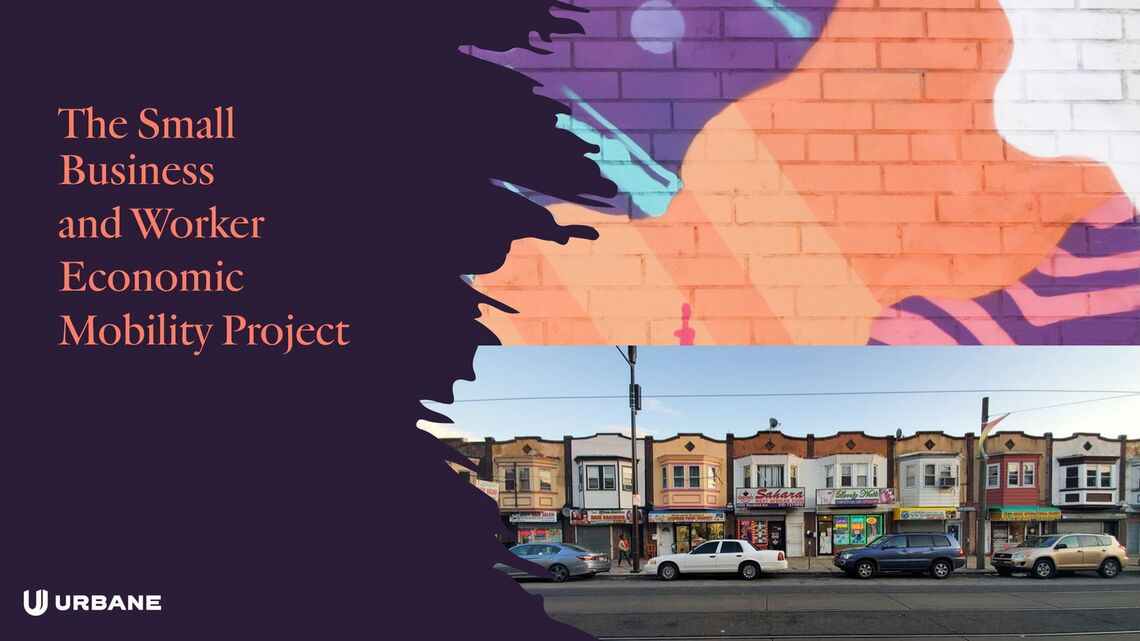The Small Business Worker and Economic Mobility Project
Small businesses often face financial and resource constraints that prevent them from implementing practices, such as higher wages, retirement plans, skills development, paid sick leave, and flexible work schedules, that can boost the economic mobility of their employees. These barriers are even more pronounced for overlooked and under-resourced business owners, such as entrepreneurs of color, those who have come into contact with the criminal justice system, undocumented immigrants, or women who have experienced trauma. Leveraging a decade of experience serving over 10,000 small businesses, Urbane believes businesses can be incentivized to adopt practices that increase economic mobility for workers.

Overview
In 2020, Urbane received funding from the Bill & Melinda Gates Foundation to understand ways small businesses can create opportunities to improve the economic mobility of low-wage workers.
The views expressed are those of the author(s) and should not be attributed to the foundation.
The Bill and Melinda Gates Foundation
2020 - 2022
Pilot Design
Database Tool Creation
Business Persona Development
Small Business Storytelling
Mixed Methods Research
Stakeholder Convening


Synopsis
Over the course of the engagement, Urbane explored the ways in which small business owners can be supported to support their workers. Despite misconceptions, most low-wage workers are employed by small businesses, many of which are owned and operated by and low moderate-income individuals.
Small businesses often face financial and resource constraints that prevent them from implementing practices, such as higher wages, retirement plans, skills development, paid sick leave, and flexible work schedules, that can boost the economic mobility of their employees. These barriers are even more pronounced for overlooked and under-resourced business owners, such as entrepreneurs of color, those who have come into contact with the criminal justice system, undocumented immigrants, or women who have experienced trauma.
Leveraging a decade of experience serving over 1500+ small businesses, Urbane believes businesses can be incentivized to adopt practices that increase economic mobility for workers. For this to succeed, however, the burden must rest on the ecosystem that supports small businesses, such as technical assistance providers, capital providers, suppliers, customers, and workforce development organizations, to name a few. Urbane developed a rubric of strategies that can influence and/or incentivize businesses to adopt mobility boosting practices while adding value and profitability to the business. To unearth these strategies, Urbane embarked in a multi-year, multi-phased project that leveraged an array of primary and secondary data collection methodologies.

Phase 1: Inquiry
In the first phase of the engagement, Urbane conducted a thorough analysis of public and private datasets to understand the types of businesses that are most frequently owned by marginalized persons and employ low-wage workers. Urbane considered industry and sector, business size, revenue, growth stage, and aspects of the individual owner, such as gender, race, age, education level, and income, amongst other characteristics. Urbane hypothesized these elements dictate business behaviors and thus will influence which of mobility-boosting employment practices are adopted.
Although this analysis was comprehensive, it was not exhaustive, allowing Urbane to tap into primary data collection, including interviews, surveys, and roundtable discussions, to round out gaps in the data. Urbane focused its primary research on four geographies, which are corollaries for the national spread: Houston, TX; Chicago, IL, and Gary, IN; Newark and Jersey City, New Jersey; and Indigenous communities in Central New Mexico. Focusing on four locations allowed Urbane to dive into the particulars of a locality’s small business landscape.
Phase 2: Collection
In the second phase, Urbane sought to better understand the ecosystem in each place by tapping into its extensive network of small business providers. It identified local officials, small business support organizations, and other providers that offered firsthand accounts of the small business experience as well as direct connections to small business owners. These partnerships helped Urbane navigate each geography’s core industries, entrepreneur demographics, local policies, cultural norms, and key players, including public, private, and nonprofit practitioners supporting and advancing small business growth.
Over the course of the engagement, Urbane conducted over 40 interviews with organizations, programs, and initiatives that serve small businesses in the four selected geographies. These interviews shed light onto the biggest challenges faced by small business owners, how business owners view job quality, policy changes that could better support the small business community, and insights into the mindset of small business owners.
These interviews were followed by a digital survey of small business owners. Over two months, Urbane surveyed 200 small business owners in New Jersey, Chicago, Gary, and New Mexico. The survey collected general information about the business, such as the industry, number of employees, yearly revenue, and data about the owner, including gender, race, age, ethnicity, education level, and income levels. The survey then sought information on business owner behaviors, including who they turn to for help, how they view their role as an employer, and who has the greatest influence on their business practices. Finally, the survey asked business owners the extent to which they offer mobility-boosting employment practices and the barriers to implementing them.

Phase 3: Analysis
The third phase of the project consisted in analyzing the insights generated by the stakeholder interview and small business owner surveys. The findings provided a roadmap for strategies that can encourage, influence, or incentivize the small business owners to adopt employment practices that improve the economic outcomes of their workers. Urbane initially developed 30 strategies which it refined down to ten. For each strategy, Urbane identified the entity that would be most successful in implementing the strategy was well as the types of businesses (such as the industry, business size, revenue, etc.) most likely to adopt it. To review findings and strategies in full, please see the Summary of Findings.
Phase 4: Deliverables
In the fourth and final phase of the engagement, Urbane selected three strategies to develop into pilot programs that could be implemented in the selected geographies. Urbane’s analysis determined which strategies will have the greatest impact on small business owners and their workers. These pilots laid out the steps needed to implement the strategy, key partners, and projected outcomes, including the anticipated number of workers and small businesses that would be impacted nationally.
In addition, Urbane partnered with ERAco, an urban strategies firm that specializes in data visualization techniques, to develop a digital and interactive database that captures the entirety of the data collected over the course of the project. The database, which is hosted on Urbane’s website, is designed to help practitioners, policymakers, and other members of the small business ecosystem understand the best ways to engage and support small business owners in efforts to support their workers.
Urbane used the database, which is informed by survey responses and interview insights, to develop a series of personas that capture key elements of typical low and moderate-income business owners. Urbane developed seven key personas from the research. These composites can be used to prioritize ongoing efforts to address the living and working conditions of America’s most marginalized communities. The persona cards can be accessed here.
We would like to acknowledge the following partners who made this work possible:
Chicago/Gary
- Art West
- Chicago Community Loan Fund
- Chicago TREND
- INNOPOWER
- Melton Strategies
- Skills for Chicagoland Future
Houston
- Asian Chamber of Commerce
- City of Houston Office of Business Opportunity
- East End Chamber of Commerce
- Greater Houston LGBT Chamber of Commerce
- LiftFund
Newark and Jersey City
- Greater Newark Enterprises Corporation
- Jersey City Economic Development Corporation
- LISC Greater Newark
- New Jersey Community Capital
- Rising Tide Capital
New Mexico



